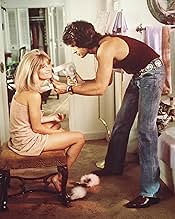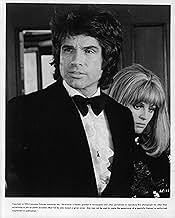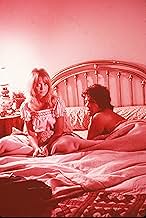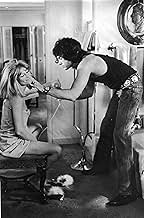No dia da eleição de 1968, um cabeleireiro mulherengo está muito ocupado cortando cabelos e lidando com suas várias namoradas e sua amante, cujo marido ele conhece e descobre que ele está te... Ler tudoNo dia da eleição de 1968, um cabeleireiro mulherengo está muito ocupado cortando cabelos e lidando com suas várias namoradas e sua amante, cujo marido ele conhece e descobre que ele está tendo um caso com sua ex-namorada.No dia da eleição de 1968, um cabeleireiro mulherengo está muito ocupado cortando cabelos e lidando com suas várias namoradas e sua amante, cujo marido ele conhece e descobre que ele está tendo um caso com sua ex-namorada.
- Ganhou 1 Oscar
- 3 vitórias e 11 indicações no total
- Direção
- Roteiristas
- Elenco e equipe completos
- Produção, bilheteria e muito mais no IMDbPro
Avaliações em destaque
Yet, I cannot blame this film for what it does well, which is portray the life of a man who simply wants a good time and success and an accurate picture of the times of 1968 when Nixon was about to be elected, the Summer of Love was almost upon us and free love was a progressive idea. Yet, this movie seems harder on these characters than would be let on. Perhaps it is a nostalgic look-back to a time when there was a great feeling of new-found freedom but these people didn't know what to do with it. Some also criticize it for being chauvinistic but in reality, the females are the most confident, the most aware of their situations and the only ones able to make sense of what the next step should be.
As you might expect, the acting is very good with Beatty playing the character completely aloof, always in his own world trying to think faster than the situations being thrown at him. He realizes what a mess he's in but also knows he doesn't want out so easy. Goldie Hawn is a wonderful, charming and confident actress whose beauty is secondary to her talent while Julie Christie gives the film's best performance as a conflicted woman who seems to know exactly what she will do despite not letting on. The Academy Awards only recognized Lee Grant and Jack Warden, perhaps because they represent a past age, a world about to get completely swept up in the new era being established during the '60s.
Some see it as a political satire, others see it as an unfunny comedy about the consequences of free love. I see it as both as well as a very smart character study of what not to do but also why it's so fun doing it.
Beatty has never been more charming - or revealing as emptily vain as anyone so "successful" with women can become, and the film switches between surprisingly adult material even for now with a concern for mid-life crises, cultural politics, and ultimately, a cynical view of how the free-wheeling 60s counterculture didn't take themselves seriously enough. Robert Towne's influence in the script is clearly evident.
Already "dated" when it came out, it's a great snapshot of the times, its concerns and issues, and is relevant today.
The great joke of the film is that George exists solely to please other people. He's entirely selfless. Whilst Ashby paints the rest of society as being self-centered and selfish, George dutifully cuts hair, tends to women and bounces from one lover to another. The poster boy for altruism, he exists solely to make other people happy.
Though marketed as a sex comedy, the film works better as a political statement. It takes place during the eve of the 1968 presidential election (in which Nixon was elected) and attempts to capture the last vestiges of a certain crazy, carefree era, Ashby contrasting whimsical Pre-Nixon attitudes (nonchalant sex, free love, a kind of social cohesion which George can no longer maintain), with the knowledge that Watergate, corruption, lies and the general pessimism of the Nixon era, were all on the horizon. By the film's end, George can no longer love everybody. The glue has failed and myopia, separation, selfishness and egotism on a grand scale has begun.
Unsurprisingly, everyone in "Shampoo" aspires to success in both bed and bank. The characters are constantly working. Working at their jobs, on themselves, or on their lovers etc. But Ashby's larger point is that they ultimately have no significant political or cultural impact. They're too selfish, myopic and self centred, and thus the Nixon administration, which comes about at the end of the film, is exactly what these people deserved.
"Shampoo's" opening and closing scenes neatly portray George's own personal evolution. The film opens with him making love to one of his many women, the Beach Boys' lyrics, "Wouldn't it be nice if we were married..." pulsating on the soundtrack. The song emphasises the yearning beneath George's playboy image. By the end of the film, however, George is left alone on a hill top, watching as his women turn their backs on him and drive away with their respective partners. They've all moved on, whilst he stands there, a dead man with a pipe dream. Hard luck, man.
7.9/10 - Worth one viewing. Adam Sandler's "Don't Mess With The Zohan" would borrow heavily from Warren Beatty's work here.
Lee Grant won an Oscar for playing Lester's bored wife who can't seem to take her eyes off Beatty, and even her nymphet daughter (a young Carrie Fisher) desperately wanted him to be engaging in reciprocal sex Grant's actually quite jovial and adorable in her role as we heartily feel for her character near the climax
Warren Beatty appears either excitable or distracted through most of the story He lies, hides, and denies facts, doing whatever it takes to make everyone happy...
If you like to see Julie Christie notoriously fellating Beatty underneath an elegant dinner table well don't miss this funny sex comedy which received four Oscar nominations
Você sabia?
- CuriosidadesLovers off and on since 1967, Warren Beatty and Julie Christie broke up for good during the making of this movie. They remained friends and later worked together in O Céu Pode Esperar (1978).
- Erros de gravaçãoThe Coca-Cola can George drinks from while chatting with Lorna is a post-1968 design.
- Citações
George Roundy: Can't we just, eh, be friends?
Lorna: Okay.
[teen-aged Lorna makes George an offer he can't refuse]
Lorna: You wanna fuck?
- Cenas durante ou pós-créditosIn the opening credits, horror film producer/actor William Castle is billed as "Bill Castle," but in the end credits he is back to "William Castle."
- ConexõesFeatured in Precious Images (1986)
- Trilhas sonorasWouldn't It Be Nice
(1966) (uncredited)
Music by Brian Wilson
Lyrics by Tony Asher, Mike Love and Brian Wilson
Performed by The Beach Boys
Principais escolhas
- How long is Shampoo?Fornecido pela Alexa
Detalhes
- Data de lançamento
- País de origem
- Idioma
- Também conhecido como
- Sosyete kuaförü
- Locações de filme
- 2270 Bowmont Drive, Beverly Hills, Califórnia, EUA(Jackie's House at Bowmont & Hazen)
- Empresas de produção
- Consulte mais créditos da empresa na IMDbPro
Bilheteria
- Orçamento
- US$ 4.000.000 (estimativa)
- Faturamento bruto nos EUA e Canadá
- US$ 49.407.734
- Faturamento bruto mundial
- US$ 49.407.734

































